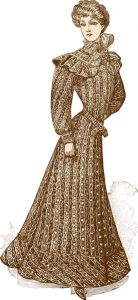
Ennui? What in the Dickens is that?
My friend Bernice and I found ourselves musing about what illness, if any, might prove a benefit. Here is a list we started. I have finished the compilation in her memory.
One – Ennui
In French novels of long ago, wealthy ladies would occasionally suffer from ennui, a kind of lassitude. They would spend days in their boudoir dressed in lovely peignoirs and receive gentlemen callers. They probably enjoyed some light refreshment and interesting discussions including gossip and mild flirtation.
It was probably a welcome diversion from routine. We could revive this “illness” and even, perhaps, have employers allow “ennui days”, as they do sick days. Men as well as women could take part in this diversion. The problem is finding the proper ennui garb for males that would be their dress analogous to the female peignoir.
Two
Much overlooked as a benefit is what is called “Tourista”, “Montezuma’s Revenge”, “Gypie Tummy” (Gypie for Egypt) or some such evoking the image of the country where such a disease is contracted. We forget that along with this discomfort is fascinating history, interesting and delicious food, works of art, performances of music, fantastic scenery and the chance to enjoy a different people and culture.
Three
Venereal disease is not looked upon with much pleasure. However, at least in literature it is considered by some to be a source of genius. In Thomas Mann’s “Doctor Faustus” the hero, Adrian Leverkuhn strikes up a remarkable bargain with Satan, who agrees to bestow genius upon this mortal. In exchange, Leverkuhn will receive no love in his life. When he dies he will have a choice of fire or ice; when he “tires” of one milieu he may go to the other changing his hell’s climate from one to the other throughout eternity. Upon agreeing to the bargain, Leverkuhn leaves immediately for a big city, has a liaison with a prostitute and contracts syphilis.
Four
Epilepsy is often referred to as the disease of holiness. In the Middle Ages people so inflicted were thought to have a special venue to the divine and so were called holy men or holy fools. Some epileptics have reported visions of heaven and God. One of the most memorable of the sufferers of this disease is Myshkin in Fyodor Dostoevsky’s “The Idiot.” He was compared to Christ for his compassion.
To claim you have an illness has some value for a woman. To avoid what is sometimes called her marital duty, she can claim a headache.
We need not forget our pleasure in one of the most likable “sickies” in literature: Mallard de Mare, the seasick duck. He was the invention of Walt Kelly, and appeared in this author’s Pogo Stories. MdM walked instead of flying during the migratory seasons because of his malady. This gave Walt a chance to have MdM react with the earthbound characters in the story.
I will not forget the delicious pleasure of just “not feeling good.” It allows you to take to your bed, start a book you’ve wanted to read and finish with a delightful nap. And I’ve saved until last mention of the pleasurable succor of Quantreau orange liqueur during an experience I had with a bout of flu.
– Ellen
Note: You might also enjoy Chemical Indicators for Advanced Homeschool from Flowers and Spices

For guys of old? Satin smoking jackets, fur-lined slippers, an arm chair, a book, a snifter of brandy.